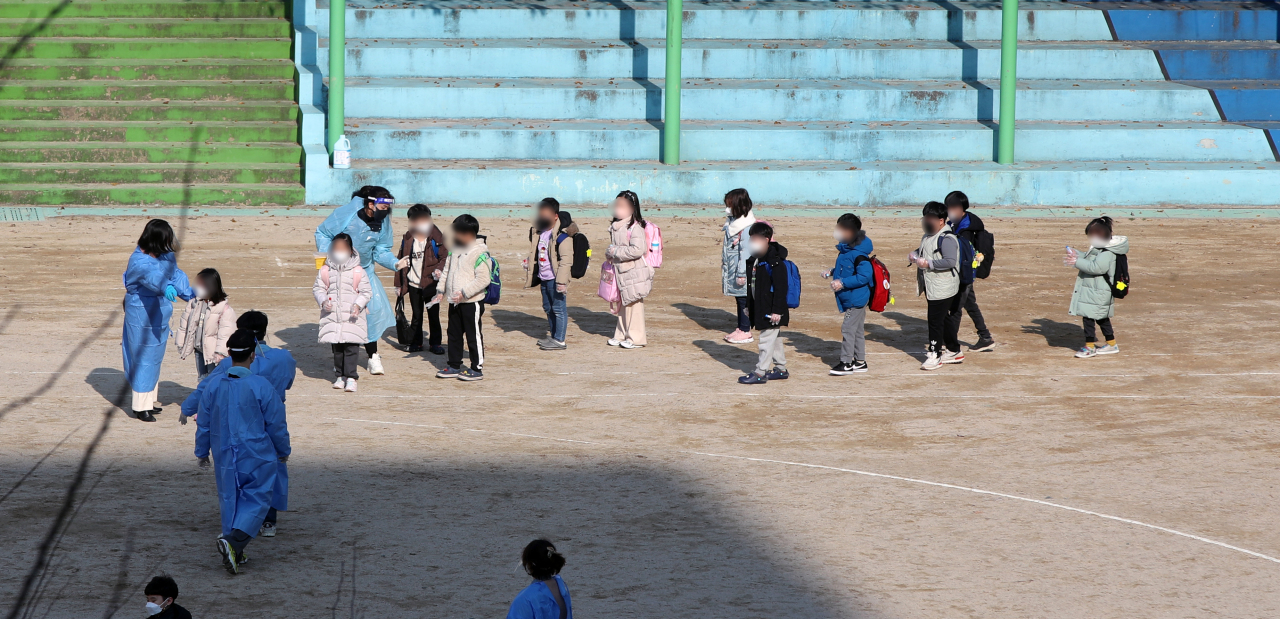As Korea opens up, government says kids should get jabs
The change in vaccine advice not reviewed by national immunization advisory committee
By Kim ArinPublished : Dec. 9, 2021 - 18:48

Up to 40 percent of kids and teens could get COVID-19 if Korea continues on with its return to normal plans without vaccinating more in the age group, according to a government expert.
Dr. Jung Jae-hun, a COVID-19 policy adviser at the prime minister’s office, told a news briefing Thursday that based on his latest modeling, as many as 40 percent of people under 18 could get infected with COVID-19 as the country opens up.
“Although COVID-19 is known to be less severe for children, as the outbreak grows, more will fall severely, even fatally sick,” he said.
Jung, who has carried out the vaccine cost-benefit evaluations for the government, said that the calculations for children have changed recently after the Nov. 1 return to normal.
Two months ago Jung had said while vaccination was “believed to be beneficial for children overall, unlike in adults, for children, the benefits did not far surpass the potential risks.”
But now, more children are getting COVID-19 than adults, with 236 12-to-17-year-olds testing positive per day over November, up from October’s average of 156. Last month, per every 100,000 people 19 and older, 167 cases were found on average. Per every 100,000 people 18 and younger, it was 210.
“The benefits of vaccination are now clearly greater than potential risks for children and teens, from the perspective of individual health,” Jung said, explaining, “These assessments can only be relative.”
“The outbreak grew worse as Korea opened up in early November, and it’s evident that the unvaccinated will suffer the worst of COVID-19, including children.”
In response to a question from one of the parents, who complained that the vaccine pass system for minors was akin to a mandate, Jung said he was “not urging vaccination.”
“But rather, think of it as an earnest plea,” he said.
Thursday’s vaccine advice targets 12- to-15-year-olds, who are the youngest eligible vaccine recipients in Korea. No vaccine is approved for use here in children younger than 12.
Speaking at the same briefing, Jeong Eun-kyeong, the chief of the Korea Disease Control and Prevention Agency, said that infection rates were falling in 16- and 17-year-olds, more than 60 percent of whom are fully vaccinated. On the other hand, not as many 12-to-15-year-olds were vaccinated, and children in this age group were catching COVID-19 at higher rates.
Jeong said that of all teens diagnosed with COVID-19 over the past month, excluding those with risk factors, around 17 percent have had to be hospitalized. None of the 11 that ended up in intensive care were vaccinated.
In people younger than 18, two vaccine doses were shown to be 100 percent effective against hospitalizations and deaths, and 96 percent effective against infection, she said.
She added that for children, COVID-19 also came with the extra risk of a very rare complication known as multisystem inflammatory syndrome in children. So far at least 11 children here have come down with the condition.
“I strongly recommend more children to get vaccinated,” she said, while adding, “Korea is not mandating vaccination for any group, and whether to get vaccinated is a matter of personal choice.” In September, she had said that only children at risk of severe COVID-19 were recommended to get vaccinated.
The shift in vaccine advice comes without the national advisory committee on immunization’s review, however.
In response to The Korea Herald’s inquiry asking if the advice had been formally deliberated by the immunization advisory committee, the disease control agency said that it had not asked for a review.
Meanwhile, for the second time in a week, Korea reported a COVID-19 death in a child younger than 10. The other child, announced Tuesday, was a 7-year-old boy who died in less than two days after he was brought in to a hospital’s emergency room. The boy, who had a chronic neurological disorder, was initially placed in home recovery.
By Kim Arin (arin@heraldcorp.com)



![[AtoZ into Korean mind] Humor in Korea: Navigating the line between what's funny and not](http://res.heraldm.com/phpwas/restmb_idxmake.php?idx=644&simg=/content/image/2024/04/22/20240422050642_0.jpg&u=)


![[Herald Interview] Why Toss invited hackers to penetrate its system](http://res.heraldm.com/phpwas/restmb_idxmake.php?idx=644&simg=/content/image/2024/04/22/20240422050569_0.jpg&u=20240422150649)
![[Exclusive] Korean military set to ban iPhones over 'security' concerns](http://res.heraldm.com/phpwas/restmb_idxmake.php?idx=644&simg=/content/image/2024/04/23/20240423050599_0.jpg&u=20240423183955)
![[Graphic News] 77% of young Koreans still financially dependent](http://res.heraldm.com/phpwas/restmb_idxmake.php?idx=644&simg=/content/image/2024/04/22/20240422050762_0.gif&u=)







![[Exclusive] Korean military to ban iPhones over security issues](http://res.heraldm.com/phpwas/restmb_idxmake.php?idx=652&simg=/content/image/2024/04/23/20240423050599_0.jpg&u=20240423183955)



![[Today’s K-pop] Ateez confirms US tour details](http://res.heraldm.com/phpwas/restmb_idxmake.php?idx=642&simg=/content/image/2024/04/23/20240423050700_0.jpg&u=)